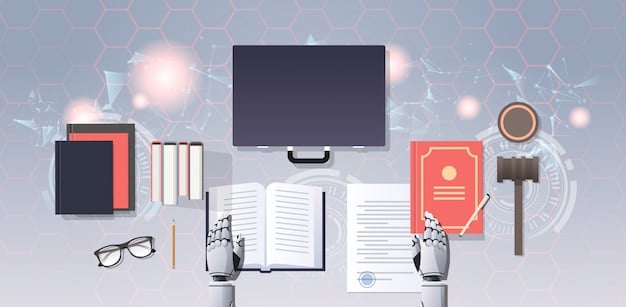AI in Legal Tech: Automating Tasks & Cutting Costs by 15%

AI in Legal Tech: Automating Tasks and Reducing Costs for US Law Firms by 15% is transforming the legal industry by automating repetitive tasks, improving efficiency, and ultimately reducing operational costs, allowing firms to focus on more strategic and complex legal work.
The legal sector, traditionally reliant on manual processes, is experiencing a significant shift with the integration of artificial intelligence. AI in Legal Tech: Automating Tasks and Reducing Costs for US Law Firms by 15% isn’t just a futuristic concept; it’s a current reality that’s reshaping how law firms operate and compete.
Understanding AI’s Role in Legal Technology
Artificial intelligence is rapidly permeating various aspects of legal technology, evolving from a mere buzzword to a tangible asset for law firms. Its applications are diverse, ranging from basic task automation to advanced analytics and predictive modeling.
AI’s ability to handle large volumes of data, identify patterns, and provide insights makes it an invaluable tool for enhancing efficiency and accuracy in legal processes.
Key Areas of AI Application in Legal Tech
AI is impacting several critical areas within legal technology, revolutionizing how firms manage information and deliver services.
- Document Review: AI algorithms can quickly scan and analyze thousands of documents to identify relevant information, saving significant time and resources compared to manual review.
- Legal Research: AI-powered search tools can access and analyze vast legal databases to find relevant precedents and statutes more efficiently than traditional methods.
- Contract Analysis: AI can automatically review and analyze contracts to identify potential risks, inconsistencies, and areas that require attention.
- Predictive Analytics: By analyzing historical data, AI can predict the outcome of legal cases or the likelihood of success in negotiations, providing valuable insights for strategic decision-making.

These are just a few examples of how AI is being leveraged within legal technology. As AI technology continues to advance, its potential applications within the legal field are sure to expand.
In conclusion, understanding the broad role of AI in legal technology is crucial for law firms looking to stay competitive and optimize their operations. By embracing AI, firms can unlock new levels of efficiency and accuracy, ultimately leading to improved client service and reduced costs.
Automating Routine Legal Tasks with AI
One of the most significant benefits of AI in legal tech is its ability to automate routine tasks that traditionally consume a large portion of lawyers’ time. This automation frees up legal professionals to focus on more complex and strategic work.
From document drafting to data entry, AI is streamlining many of the time-consuming processes that underpin the legal industry.
Examples of Automated Tasks
The range of tasks that can be automated with AI is constantly growing, offering opportunities for increased efficiency across various legal domains.
- Automated Document Drafting: AI can be used to automatically generate legal documents such as contracts, pleadings, and briefs, based on pre-defined templates and data inputs.
- Automated Data Entry: AI can extract data from documents and automatically enter it into databases or other systems, eliminating the need for manual data entry.
- Automated Legal Research: AI can automate much of the preliminary research needed for legal cases, helping lawyers to quickly gather relevant information and precedents.
- Automated Scheduling: AI-powered scheduling tools can automate the process of scheduling meetings, appointments, and court dates, streamlining administrative tasks.
By automating these routine tasks, law firms can significantly reduce the amount of time spent on administrative work, allowing lawyers to focus on more strategic and high-value activities.

This shift has a direct impact on efficiency, productivity, and ultimately, the profitability of the firm.
In summary, the automation of routine legal tasks is a game-changer for the legal industry. By embracing AI, law firms can streamline operations, reduce costs, and empower their lawyers to focus on more complex and strategic work, leading to enhanced client outcomes and a more competitive advantage.
Quantifying Cost Reduction with AI in Legal Firms
The implementation of AI in legal tech is not just about improving efficiency; it’s also about reducing costs. Quantifying these cost reductions is crucial for understanding the true value of AI in legal firms.
While the exact savings will vary depending on the size and nature of the firm, as well as the specific AI applications implemented, the potential for significant cost reduction is undeniable.
Areas Where AI Reduces Costs
AI can lead to cost savings in several key areas of legal operations.
- Reduced Labor Costs: By automating routine tasks, AI minimizes the need for manual labor, leading to lower salary expenses and improved productivity.
- Improved Efficiency: Automation allows lawyers to handle more cases in less time, leading to higher revenue generation and improved profitability.
- Reduced Errors: AI algorithms can identify and correct errors in legal documents and data, minimizing the risk of costly mistakes and legal liabilities.
- Decreased Overhead: With AI-powered tools handling tasks like document storage and management, firms can reduce the need for physical storage space and related expenses.
A 15% cost reduction, as highlighted in the topic, can be a substantial boost to a law firm’s bottom line. These savings can be reinvested in other areas of the business, such as marketing, technology upgrades, or staff development.
Realistically, the cost reductions achieved through AI will depend on various factors, including the level of adoption, the quality of the AI tools used, and the firm’s specific needs and goals.
In brief, understanding and quantifying the cost reduction potential of AI is vital for law firms considering its implementation. By carefully evaluating the areas where AI can drive savings, firms can make informed investment decisions and maximize the return on their AI initiatives.
Enhancing Accuracy and Minimizing Errors in Legal Work
Beyond cost reduction and efficiency, AI also plays a critical role in enhancing accuracy and minimizing errors in legal work. The legal profession is known for its meticulous attention to detail, and AI can help ensure that errors are minimized.
By automating tasks and analyzing data with precision, AI can reduce the risk of human error and improve the overall quality of legal services.
AI Tools for Error Reduction
Several AI-powered tools are specifically designed to help lawyers avoid mistakes and ensure accuracy in their work.
- AI-Powered Proofreading: AI algorithms can identify errors in grammar, spelling, and punctuation, providing a comprehensive proofreading solution for legal documents.
- AI-Based Legal Research Validation: AI tools can verify the accuracy and validity of legal research, ensuring that precedents and statutes are correctly cited and interpreted.
- AI for Document Analysis: AI can analyze legal documents to identify inconsistencies, contradictions, and potential risks, helping lawyers to avoid costly mistakes.
The stakes are high in the legal field, where even minor errors can have significant repercussions. AI-powered tools can provide an additional layer of scrutiny and help minimize the risk of errors.
Of course, it’s crucial to acknowledge that AI is not infallible. It’s essential to have human oversight to ensure that AI-powered systems are functioning correctly and that the results are carefully reviewed.
To summarize, the use of AI to enhance accuracy and minimize errors is a crucial benefit of legal tech. By leveraging AI-powered tools, law firms can provide higher quality legal services, reduce the risk of liabilities, and build trust with their clients.
Challenges and Considerations When Adopting AI
While the integration of AI into legal tech offers numerous benefits, it is also important to acknowledge the challenges and considerations that come with adopting these technologies.
Successfully implementing AI requires careful planning, attention to ethical considerations, and a commitment to ongoing adaptation.
Key Challenges to Adoption
Law firms face several potential challenges when incorporating AI into their workflows.
- Data Privacy and Security: Law firms must ensure that sensitive client data is protected when using AI systems, adhering to strict privacy regulations.
- Ethical Considerations: As AI technologies become more sophisticated, ethical concerns around bias, fairness, and accountability must be addressed.
- Initial Investment Costs: Implementing AI systems can require a significant upfront investment, including software licenses, hardware upgrades, and training expenses.
- Integration with Existing Systems: Integrating AI tools with existing legal software systems can be complex and may require customization or upgrades.
These challenges are not insurmountable, but they need to be carefully considered and addressed as part of the AI adoption process.
Furthermore, law firms should prioritize transparency and explainability when using AI systems, making sure that lawyers and clients understand how decisions are being made.
In short, while AI offers great potential for legal tech, it’s essential to be aware of the challenges and considerations that come with adoption. By carefully planning and addressing these issues, law firms can maximize the benefits of AI while minimizing potential risks.
The Future of AI in US Law Firms: Trends and Predictions
The future of AI in US law firms is looking bright, with new trends and advancements on the horizon that promise to further transform the legal industry.
As AI technology continues to evolve, its applications in legal tech are likely to expand and become more sophisticated.
Emerging Trends and Predictions
Some key trends and predictions for the future of AI in U.S. law firms include:
- Increased Use of Natural Language Processing (NLP): NLP technologies will enable AI systems to better understand and analyze legal language, leading to more accurate document review and legal research.
- AI-Driven Legal Advice: AI-powered chatbots and virtual assistants will be able to provide basic legal advice and guidance to clients, improving access to justice and reducing the burden on lawyers.
- Greater Emphasis on Personalized Legal Services: AI will allow law firms to offer more personalized legal services to clients, tailoring their approach to individual needs and preferences.
- AI for Dispute Resolution: AI will be used to facilitate dispute resolution processes, helping to resolve conflicts more efficiently and effectively.
These trends suggest that AI is poised to play an even greater role in shaping the future of law firms in the United States.
Looking ahead, law firms that embrace AI and invest in its development are likely to be better positioned for success in the ever-evolving legal landscape.
Ultimately, the future of AI in US law firms is full of opportunities, and those who adapt and embrace AI will be best positioned to thrive in the years to come.
| Key Point | Brief Description |
|---|---|
| 🤖 Automation | AI automates routine legal tasks, increasing efficiency. |
| 💰 Cost Reduction | AI reduces labor and overhead costs, improving profitability. |
| ✅ Accuracy | AI minimizes errors, enhancing the quality of legal services. |
| 🔮 Future Trends | NLP, AI-driven advice, and personalized services are emerging. |
Frequently Asked Questions
▼
AI automates tasks like document review, data entry, and legal research by using algorithms that can quickly process and analyze large volumes of data. This saves time and resources for legal professionals.
▼
Cost reduction areas include reduced labor costs through automation, improved efficiency allowing more cases to be handled, minimized errors leading to lower liabilities, and decreased overhead with efficient document management.
▼
AI enhances accuracy through AI-powered proofreading, validation of legal research, and document analysis to identify inconsistencies. These tools ensure that errors are minimized, and quality is improved.
▼
Challenges include ensuring data privacy and security, addressing ethical considerations like bias, dealing with initial investment costs, and integrating AI with existing systems. Careful planning is essential.
▼
Future trends include increased use of Natural Language Processing (NLP), AI-driven legal advice through chatbots, greater emphasis on personalized legal services, and the use of AI for dispute resolution.
Conclusion
In conclusion, the integration of AI in Legal Tech: Automating Tasks and Reducing Costs for US Law Firms by 15% presents a transformative opportunity for the legal industry. By embracing these technologies, firms can achieve significant cost savings, enhance accuracy, and improve efficiency, ultimately leading to better outcomes for both lawyers and clients.





